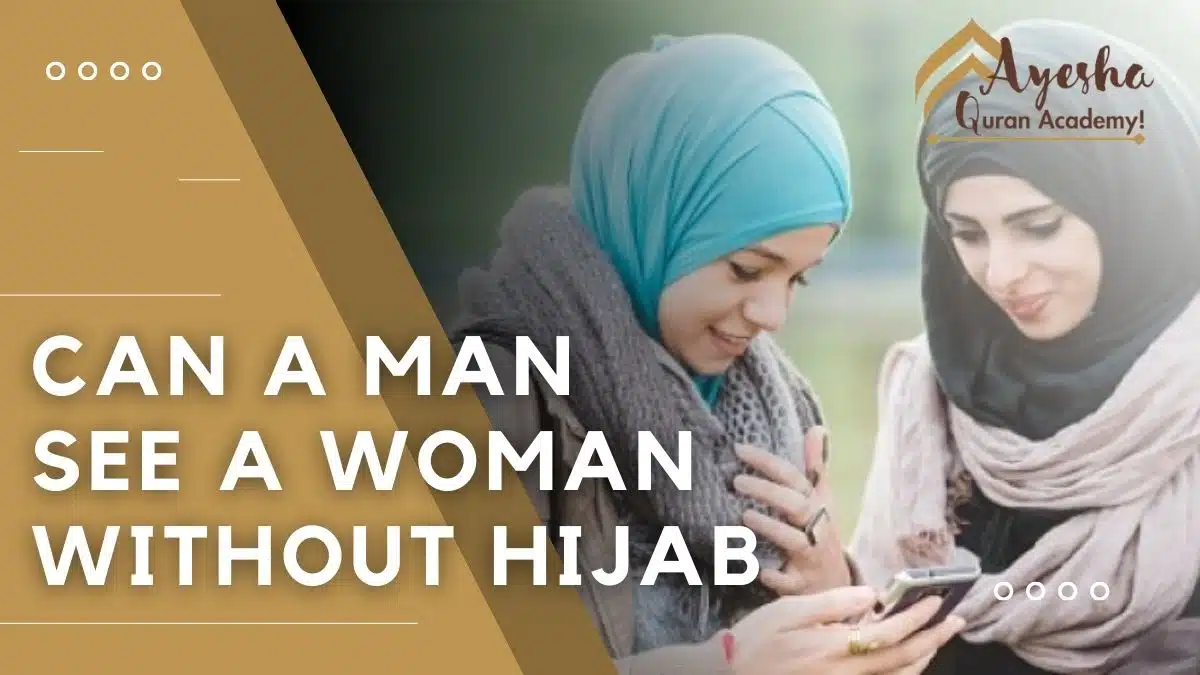In the realm of Islamic matrimony, the concept of modesty, often symbolized by the hijab, holds paramount importance.
In Islam, the question of whether can a man see a woman without a hijab before marriage is a matter of interpretation and cultural context.
The key consideration in Islam regarding interactions between unrelated men and women is the principle of modesty and the avoidance of any actions or situations that may lead to impropriety or temptation.
Can a Man See a Woman Without Hijab
According to Islamic teachings, men are not permitted to see women without hijab. Islam commands us to lower our gaze and prohibits looking at non-mahram women, with certain exceptions that arise out of necessity.
One such exception is when proposing marriage, as it is a crucial decision that affects a person’s life.
The hijab is not merely a piece of clothing but a symbol of modesty, privacy, and submission to God (Allah) in Islam.
It is worn by Muslim women as a sign of devotion and adherence to their faith. However, interpretations of how and when it should be worn can vary widely.
Can Man See a Woman Without a Hijab Before Marriage
One of the factors that affect whether a man can see a woman without a hijab before marriage is the cultural context.
In some Islamic cultures, there is a strict separation of genders, and it’s considered inappropriate for a man to see a woman without a hijab unless they are closely related or married. In contrast, in other cultures, there may be more flexibility in this regard.
who can see a woman without her hijab?
In Islam, modesty and privacy are upheld through the concept of hijab. While in private spaces, women can remove their hijab around close family members they cannot marry (mahram), such as fathers, brothers, sons, uncles, and nephews.
In public settings or with non-mahram men, the hijab is traditionally worn to maintain modesty and social boundaries.
Variations exist across cultures and individual interpretations, with some covering their hair and face fully, while others reveal parts of their hair or face.
Ultimately, the choice to wear a hijab and its extent is personal, influenced by faith, cultural norms, and individual preferences.
Respecting this decision and avoiding judgment is crucial for fostering understanding and inclusivity.
The Importance of Wearing a Hijab in Islam.
1. Preserving Modesty
Modesty is a cherished virtue in Islam, and the hijab is its embodiment. Worn by Muslim women, the hijab symbolizes a commitment to upholding Islamic ethics, particularly in interactions with the opposite gender.
It serves as a visible testament to a woman’s modesty and humility, reminding her of the importance of maintaining her dignity and self-respect.
2. Maintaining Self-Respect.
The hijab is not merely a piece of cloth; it is a powerful symbol of dignity. Muslim women, by wearing the hijab, declare their desire for recognition based on their intellect, character, and contributions rather than their physical appearance.
The hijab acts as a shield against objectification, reaffirming a woman’s self-worth and asserting her right to be treated with respect and honor.
3. Strengthening Faith
Wearing the hijab is an act of faith and devotion in Islam. It signifies a woman’s submission to the divine commandments and her dedication to leading a life per Islamic principles.
Each day, as a woman adorns the hijab, it serves as a tangible reminder of her spiritual journey and her unwavering commitment to Allah, strengthening her faith in the process.
Wearing a Hijab when you’re Married.
A Mutual Understanding
In the context of marriage, the hijaab takes on added significance as it represents a mutual understanding between spouses. It serves as a visible symbol of the sanctity of their relationship, where the husband respects his wife’s choice to wear the hijab.
This mutual understanding reinforces the importance of preserving modesty and respect within the confines of the marital bond.
Fostering Trust and Respect
The hijab plays a pivotal role in fostering trust and respect within a marriage. By upholding the practice of hijaab, both spouses ensure that their interactions with the opposite gender outside of the marriage remain respectful and within the boundaries defined by Islamic teachings.
This trust is foundational for building a strong, harmonious, and lasting marital relationship.
Strengthening Family Values
Within the family unit, the hijab serves as a tool for transmitting Islamic values to the next generation.
Children raised in a household where the hijab is upheld witness the importance of modesty, faith, and respect within a family.
This, in turn, helps nurture a new generation of devout Muslims who understand the significance of the hijab in the context of marriage and family values.
The Reasoning for Wearing the Hijab
Protection from Negative Influences
One of the profound wisdom behind the hijab is its role in shielding individuals from negative influences and distractions.
In the context of marriage, it helps maintain a healthy, focused, and harmonious relationship by preventing external factors from causing discord.
By wearing the hijab, individuals create a protective barrier that safeguards their hearts and minds, preserving the purity of their marital bond.
Promoting Spiritual Growth
The hijab also serves as a powerful tool for promoting spiritual growth within the context of marriage.
It acts as a constant reminder of the importance of maintaining a strong connection with Allah and seeking His guidance in all aspects of life, including the marital relationship.
By wearing the hijab, individuals nurture their faith and cultivate a deep sense of spirituality, which in turn strengthens their marital bond.
Preserving Marital Intimacy
Preservation of marital intimacy is another vital aspect of the wisdom behind the hijab.
It ensures that the intimacy shared between a husband and wife remains a private and sacred affair, enhancing the emotional and spiritual connection between them.
By upholding the hijab, couples create a secure space within their marriage where trust, respect, and love can flourish, leading to a more profound and fulfilling marital relationship.
Conclusion
the question “Can a man see a woman without hijab?” exploration of Islamic principles surrounding modesty.
Through our journey, we’ve unraveled the essence of hijab in Islam, emphasizing its role in upholding dignity and fostering respectful interactions.
It becomes evident that the wisdom behind the hijab extends beyond a mere garment—it symbolizes a woman’s desire for recognition based on intellect and character rather than physical appearance.
Transitioning from the intricacies of Islamic teachings to real-world implications, we recognize that open and honest communication, within the context of marriage or otherwise, plays a pivotal role.
While occasional privacy is acknowledged, concealing significant matters from a spouse can erode trust, underscoring the importance of transparency.
In navigating this discourse, it’s crucial to strike a balance between cultural interpretations and individual choices, understanding that perspectives on the hijab may vary.
Ultimately, the conversation surrounding the visibility of a woman without a hijab is not just a matter of appearance; it’s an exploration of values, respect, and the intricate tapestry of Islamic ethics.
Related Articles
- Believer in Islamic Mysticism NYT
- Surah Yaseen Transliteration Transform Your Prayers Today
- Is Provolone Cheese Halal or Haram In Islam?
- Is Fanta Cold Drink Halal or Haram?
FAQ’s
Yes, in many Islamic cultures, Muslims can see their future spouse before marriage, often with the consent of both families and within the boundaries of modesty and respect.
Yes, it is permitted after marriage. During sex, a husband and wife can see each other’s private parts.
In a marriage, it’s generally encouraged to have open and honest communication. While occasional privacy is normal, hiding significant matters from your spouse may lead to trust issues and you should approach it with caution.
No, the practice varies across cultures and individual choices within the Muslim community.
Open and respectful communication is key. Couples should discuss their beliefs and come to a mutual understanding.
It’s a matter of personal choice. Such a request should be made respectfully and without pressure.


